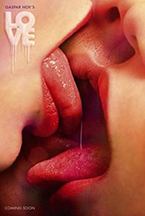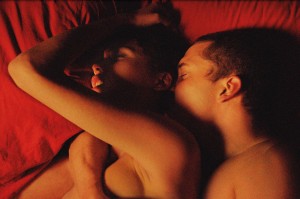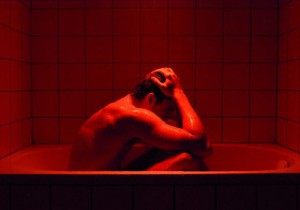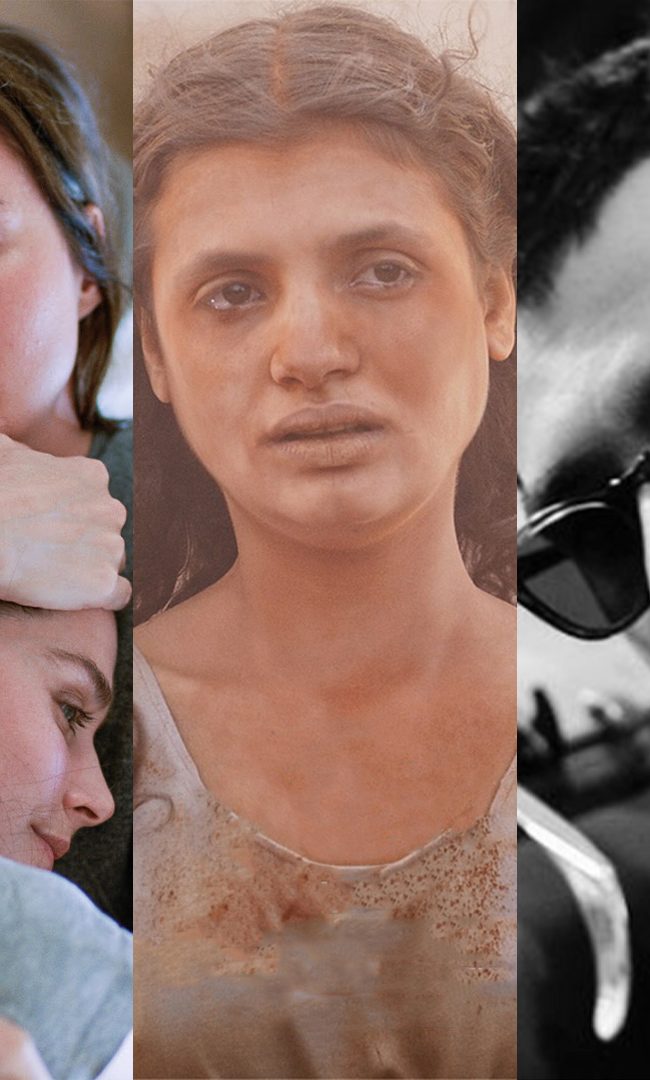
(Gaspar Noë has been delighting cinephiles and terrorizing casual movie-goers for close to two decades. With only four feature films under his belt Noë is still a name that thrills us when we see a new project coming down the pike. His latest, Love, once again pushes audience confort levels to the extreme but not the way he normally does. After its premiere at Cannes Love was picked up for U.S. distribution but when it will be released remains to be seen.)
Films that elicit a strong reaction whether positive or negative are doing something right. We can be confused, stifled, frustrated, infuriated but this only leads us back to the work: to see what we saw anew, to see if we’ve changed while away. Gaspar Noë is still labeled an enfant terrible at age 51 so safe to say his disruptive powers have not waned. Each of Noë’s feature films, of which there have been four, have shocked or offended or challenged, depending on the audience member.
I Stand Alone, his first, baits the audience with a protagonist so despicable it draws into question the very notion of identification; the hero’s sense of self-loathing cannot match the viewer’s. But Noë became a real international presence with Irreversible. Accounts of fainting and mass walkouts in the audience at Cannes upon its release overshadowed the film’s visual audacity, a heavily stylized approach that is indeed dizzying, but captivatingly so. And this is to say nothing of the one-of-the-hardest-scenes-to-watch-in-all-of-cinema wherein Monica Bellucci is brutally attacked and raped in a single long take; his choice not to cut collapses the viewer/subject relationship and the result is sickening on a level rarely reached in fiction. Noë delights in challenging what an audience can handle and this is furthered in his kaleidoscopic drug-fuelled depiction of Tokyo in Enter The Void. Instead of the brutality of Irreversible, Noë bombards and finally overwhelms with a drug trip turned hell on earth. And now Love.
Love’s reputation preceded itself long before its theatrical release in France or Cannes debut. Its promotional material included an ejaculating penis and Noë was quoted as saying that his intention with the film was “to make girls cry and give boys hard-ons.” This truncated director’s statement feels increasingly out of tune in a world where gender lines are constantly influx, in negotiation, and making steps toward progress. It’s a retrograde position that runs counter to Noë’s regular status as disruptor; even if his films usually have such banal mores they have at least in the past amazed in their formal execution, pushing the limits of their subject matter through their grotesque representations.
Thus far, the main criticism lobbed at the film is its anti-climactic nature; the film fails to shock, the heteronormative intercourse is filmed conventionally, the male gaze the only one given any credence. Noë’s hero Murphy (Karl Glusman) asks his love Elektra (Aomi Muyock) what her foremost sexual fantasy is and she responds from his point of view and not her own. It’s understandable how anyone who does not share these relatively tame male heterocentric fantasies would feel alienated by these words as they come from someone who it’s safe to say hadn’t thought them in the first place. Love is not a sexually progressive film. But, in a sense, it never purported to be; the posters and trailers exist to stir and in that they’ve more than served their purpose.
Noë said of the film at its Cannes press conference, “I wanted to show feelings. I’ve never been raped, I’ve never suffered from incest, like some of my characters, and being in love is quite an amazing thing to portray. This has happened to me.” The question then becomes: how do the scenes upon scenes of explicit sex enhance the viewer’s sense of the characters’ love they attempt to convey? This question brings to mind another film that caused a stir at Cannes two years before for its frank depictions of intercourse: the 2013 Palme d’Or winner Blue Is The Warmest Color.
For all its alleged gratuity, what makes Blue so winning (including in the eyes of that year’s jury) is that the sex scenes work in a narrative dimension. The way those scenes are performed, captured and presented, give us true insight into the character’s development and of their budding love, more specifically the arc of the lead Adele’s sexual awakening, which is itself the topic of the film. The scenes are crucial to the story; we would know so much less without them. Conversely, the sex scenes in Love don’t seem to reflect or shed light upon their characters respective states of mind, or of the evolution of their relationship. They have sex because they are in love, because they like to pleasure each other, because they themselves like pleasure. Unlike for Murphy, Elektra and their nymphet neighbor Omi (Klara Kristin), these ideas don’t quite satisfy.
Noë is a master stylist and a filmmaker who has never tried to approach the real but rather chooses to take us out of it. The moody color palette of reds and oranges, the soaring guitar solos matched with classical music all help create a dreamy landscape of the bedroom. In its heightened reality, perhaps Loveis better understood as a melodrama. Murphy and Elektra are prone to hysterics, their emotions only peaks and valleys. They come across as types, but proudly so; they scream and weep with a melodramatic, performative flair. The camera lingers on Murphy bashing a door for far longer than narratively relevant, his breakdown the centerpiece, not a cause or effect, but an event unto itself. Glusman’s Murphy renders a particularly histrionic turn but it’s one that’s in service of the story he’s helping to tell.
(A note: Love was filmed in 3D and has been labeled a “3D porn” in much of its press. It’s unclear how its 3D-ness enhances the story. The very decision to shoot in 3D feels like a provocation, which is textbook Noë.)
In a sense, Noë has presented something of a piece with his previous works. Love still shocks, or at the least surprises, just not in the way that was expected. Might that be his point? Noë has called Love “a mellow pornographic film.” For all of its sexual pyrotechnics and truly wonderful visual flourishes, that proves to be an apt description.
– Jesse Klein













